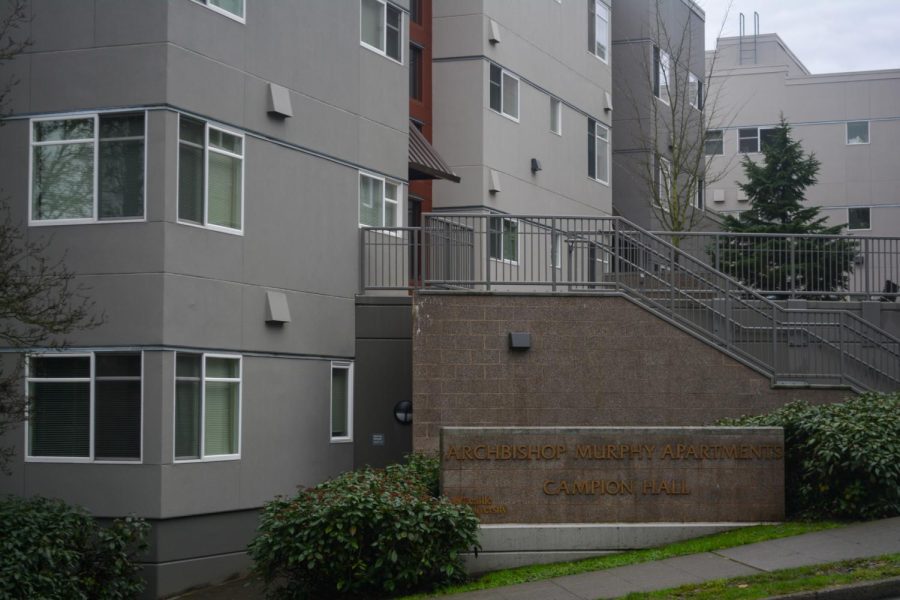Students Raise Concerns with Apartment Security
On Dec. 20, Fourth-year Psychology student Kaitlyn Mahowsky-Adams recalls returning to their Murphy apartment. Their roommate, Fourth-year Music and Psychology student Grace Stuewe, was away for winter break.
“Sometimes I leave the lights on, because it gets dark out so quickly now. When I came home all of my lights were turned off,” Mahowsky-Adams said.
Mahowsky-Adams called Seattle University’s Department of Public Safety (DPS) to report that the lights were off, but Mahowsky-Adams thought they themselves had potentially forgotten the lights were turned off
“It wasn’t until later that night I went into Grace’s room to water their plants for them, and something just felt wrong when I went in there. When I looked at Grace’s desk, things that I had put away for Grace were taken out of their drawers and put all over their desk, and there were used tissues on the desk as well that weren’t there the other day,” Mahowsky-Adams said.
They called DPS again to notify them of these changes in their room, and when the officers arrived, Mahowsky-Adams conducted a review of the house.
“I noticed that one of my medications was emptier than it was that morning,” Mahowsky-Adams said. The theft was enough to spur administrative action. “They moved me into Chardin for two days.”
Mahowsky-Adams felt appreciative for the Public Safety officers’ help that night, but they and their roommate were less than impressed with their follow-ups with the department.
“I was on the phone all day with them after this happened,” Stuewe said. “The first time I called Public Safety, the officer actually hung up on me.”
Stuewe engaged in a series of emails with Housing and Residence Life and DPS which reveal an unclear picture of who was given permission to enter the room and when.
“Unfortunately, there was some misinformation that occurred about a fire inspection in that room, and that was due to speculation from preliminary information that a fire check had occurred in that building, and that rooms were accessed. In actuality, the fire testing did not occur until two days after the incident was reported and did not include going into any resident rooms,” DPS Executive Director Craig Birklid said.
The roommates felt frustrated by what they perceived as conflicting and insufficient information about the breach of the room. They allege that their apartment could have been tampered with by someone officially affiliated with Seattle U.
“The people that were in our room still haven’t been investigated, and the thing is, there were no signs of forced entry, so we know that the people that were in our room had a key to our room and they might work for the university for all we know,” Stuewe said.
After the initial inspection of the apartment, the DPS daily incidents report page registered the case as “closed,” which caused Stuewe to make their situation known on social media.
The official Seattle U Instagram account swiftly responded to Stuewe by apologizing for any issues they may have had and requesting that they reach out to the school through official channels. The post has since been deleted.
Birklid explained that the “closed” incident report was simply a result of finishing the initial report of the case, rather than the closure of the entire investigation.
“Typically, when a report gets finished and submitted, it automatically closes, but that doesn’t mean that we are no longer interested in any information about that, it just means that the report has been submitted. We continue to investigate,” Birklid said.
The incident report page now lists the investigation as “open” to ensure that students are aware that information is still being collected on the incident. DPS does not currently have any additional information to share.
“We have not found any evidence at this point of unauthorized entry to the room, but we are waiting to hear back from all of the residents of the building,” Birklid said.
To avoid theft in the future, he encouraged students to keep their cars locked, and to stay safe from digital theft by never responding to spam job offer emails that are often sent to Seattle U accounts.
While the investigation continues, Mahowsky-Adams and Stuewe express that they are unimpressed with the way the university has handled the situation and are concerned with the safety of students in the future.
“If this happened to us, it could have happened to other students too, and I think the fact that the university isn’t taking this seriously says a lot about how much they actually value their Jesuit mission,” Stuewe said.
While students raise concerns about campus security, Seattle U continues to conduct the constant work of securing a campus in a major urban area.


